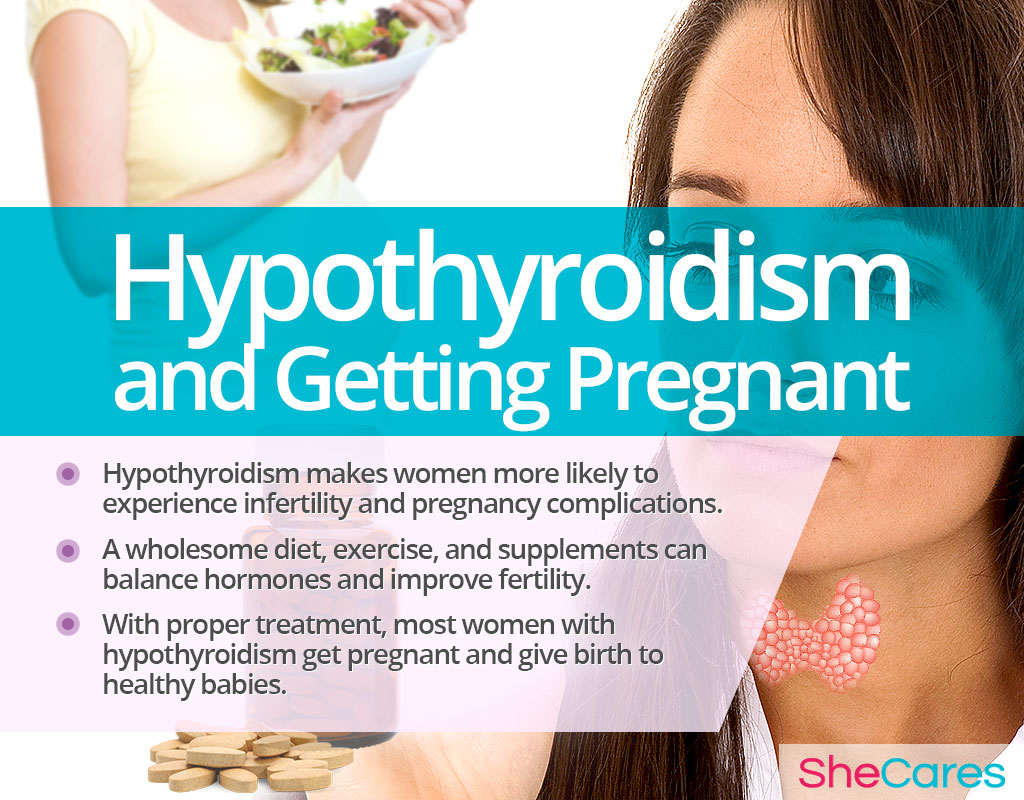Brief Overview of Hypothyroidism
The most common cause of hypothyroidism is iodine deficiency or an autoimmune disorder called Hashimoto's thyroiditis, which involves the body mistakenly attacking its own thyroid cells. This damage results in insufficient production of hormones, which leads to low thyroid levels and high TSH levels.
The symptoms of hypothyroidism include fatigue, poor concentration, weight gain, depression, and muscle pain, many of which can be intensified by pregnancy itself.
Possible Effects of Hypothyroidism on Conception and Pregnancy
Effects of Hypothyroidism on Fertility
Thyroid hormones interact with reproductive hormones, such as estrogen and progesterone. So, their low levels might adversely affect a woman's chances of getting pregnant by causing:
- Irregular periods
- Ovarian dysfunction
- Insufficient egg maturation
- Ovulation abnormalities
- Decreased libido
Hypothyroidism has also been linked to an increased risk of polycystic ovarian diseases (PCOS), which is well recognized for causing infertility.
Effects of Hypothyroidism on the Mother and Baby
Women with an underactive thyroid in pregnancy are at a higher risk of developing anemia, pregnancy-induced hypertension, myopathy, postpartum bleeding, or congestive heart failure.
Poorly controlled maternal hypothyroidism might also affect baby's development, especially the brain and nervous system, leading to low birth weight, birth defects, or cognitive abnormalities in an infant.
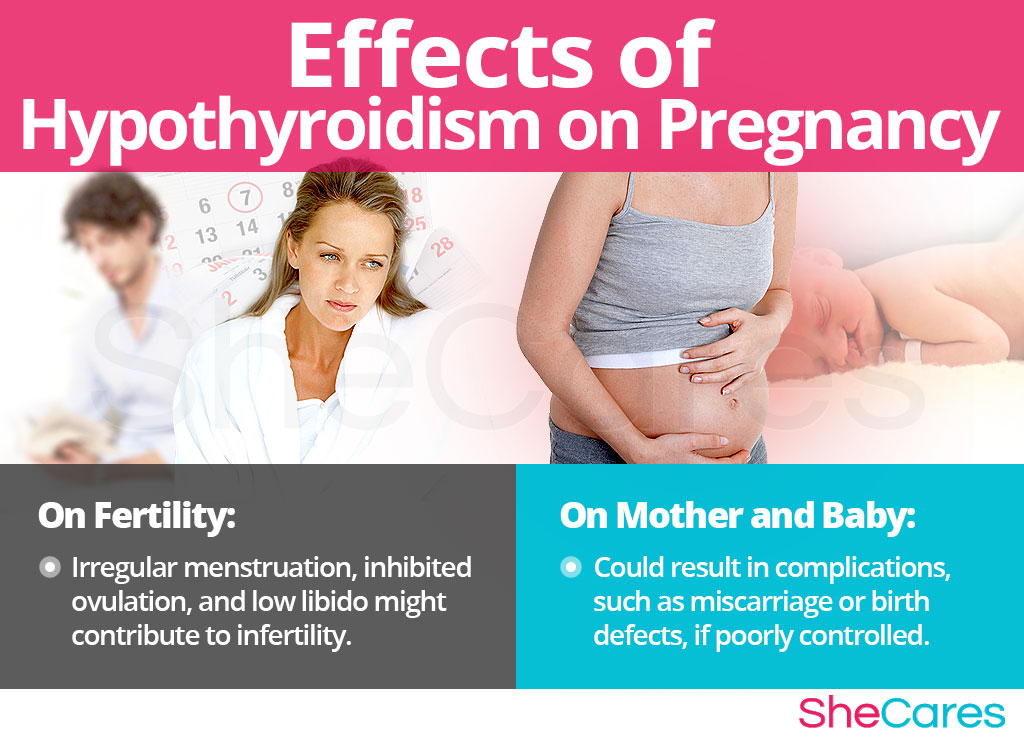
Risks and Complications
An uncontrolled hypothyroidism might lead to preeclampsia, neonatal respiratory distress, premature birth, miscarriage, or stillbirth.
Action Plan
Control Hypothyroidism before Pregnancy
Your goal in preconception is to balance your thyroid and reproductive hormones. It will improve your fertility, prepare your body for pregnancy, and reduce the symptoms of an underactive thyroid.
Treatment
An underactive thyroid is most commonly treated with a medication called levothyroxine, which is safe and can be continued throughout pregnancy. It stabilizes the hormones and can restore normal menstruation.
Subclinical hyperthyroidism, which occurs when TSH levels are high but thyroid hormones are within a normal range, is often managed without medications in non-pregnant women, but during pregnancy, it requires a low-dose levothyroxine to prevent complications.
Healthy Diet
Hypothyroidism slows down metabolism. So, maintaining a healthy weight might be a challenge for some women. Choose foods from all groups that improve your ovarian function and nourish your thyroid gland, such as those rich in:
- Fiber: vegetables, fruits, and whole grains
- Selenium: eggs, oats, Brazil nuts, and mushrooms
- Zinc: cereal, cashews, kidney beans, chicken, or chickpeas
- Iodine: milk, potatoes, turkey, yogurt, and beans
- Omega-3 fatty acids: salmon, nuts, and avocado
Also, drink plenty of water to improve your cervical mucus and boost your fertility. Avoid soy products, such as tofu or soy milk, as there is evidence that it might interfere with the absorption of thyroid medication.
Vitamins and Supplements
Prenatal vitamins, such as folic acid, can increase fertility and prevent complications. Learn more about prenatal vitamins.
Hormone-regulating supplements, like Macafem, can boost your libido, balance your hormones, and increase your odds of getting pregnant. They have also been found to improve the function of the endocrine system.
Iodine supplements might be necessary for some women if this mineral is not sufficiently supplied with food. Iodine is used by the thyroid to make thyroid hormones.
Selenium and zinc supplements have been found to decrease the risk of developing goiters and thyroid tissue damage.
It is always recommended to consult the use of any supplements with your doctor as their excess may cause adverse reactions.
Adequate Exercise
Exercise will improve your metabolism and help you maintain a healthy weight. It has also been shown to improve fertility and reduce the symptoms of hypothyroidism.
Opt for moderate-intensity cardio workouts at least 30 minutes a day, 5 days a week.
Stay away from weight lifting and other strenuous physical activity as it might inhibit your menstrual cycle.
Good Habits
Now it would be a good time to quit smoking, alcohol, and illicit drugs. They might cause infertility and birth defects once you are pregnant.
An uncontrolled hypothyroidism can lead to depression, which might play a role in fertility issues. You can battle your depression with therapy, natural therapies, or medication.
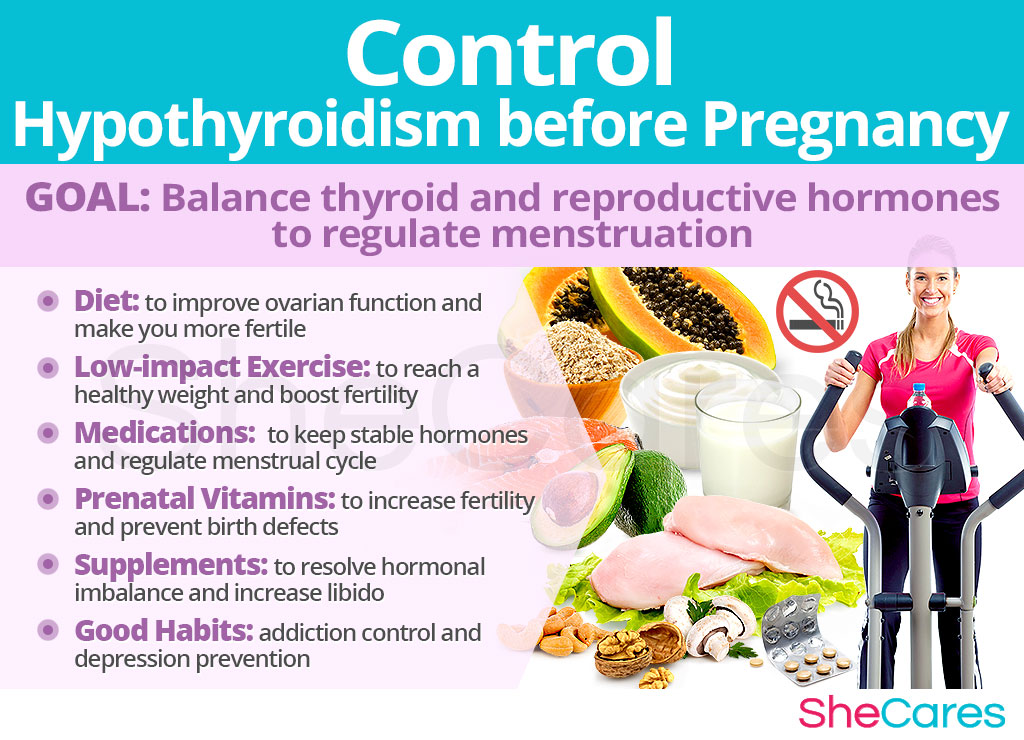
Tips for Conceiving with Hypothyroidism
While conceiving, maintain good habits that have proven effective so far and consider:
Adding some plant-based proteins to your diet, such as beans or nuts, to enhance ovulation.
Having sex daily three to five days before and on your ovulation day to increase your chances of conceiving.
Giving yoga or meditation a try to optimize your fertility and reduce stress.
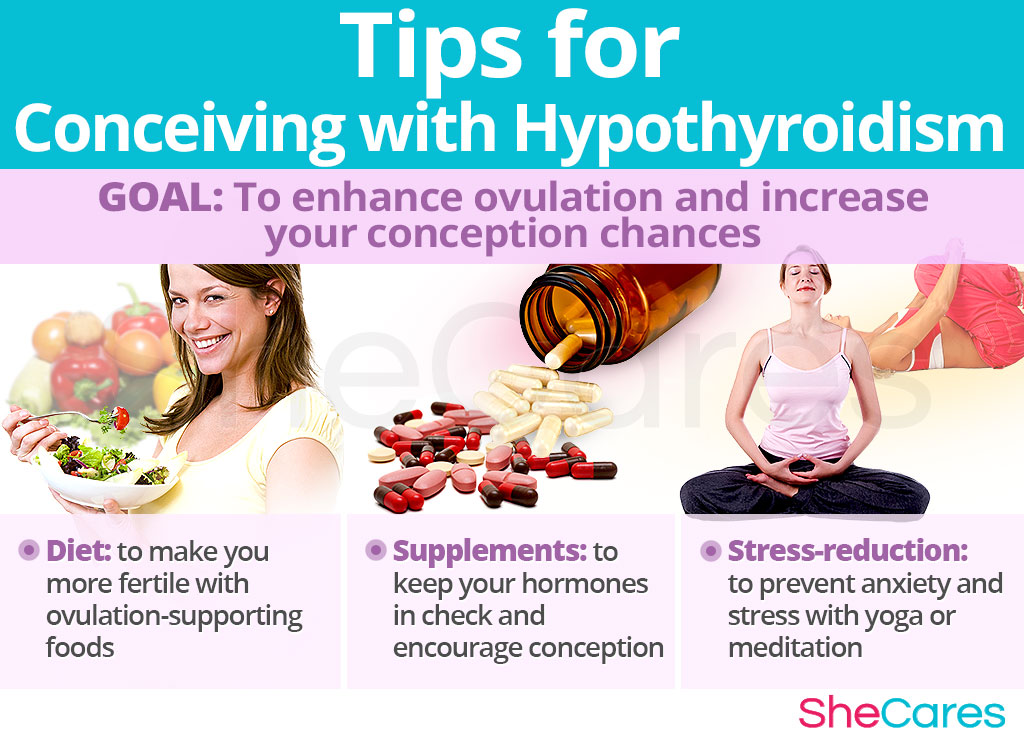
Manage Hypothyroidism during Pregnancy
Well-controlled hypothyroidism during pregnancy should not cause serious complications.
Thyroid function test is recommended every six to eight weeks to properly monitor your health status for possible adverse reactions.
Pay attention to your food intake to stay within a healthy pregnancy weight gain range.
If you suffer from fatigue or muscle pain, consider physical therapy or therapeutic massage.
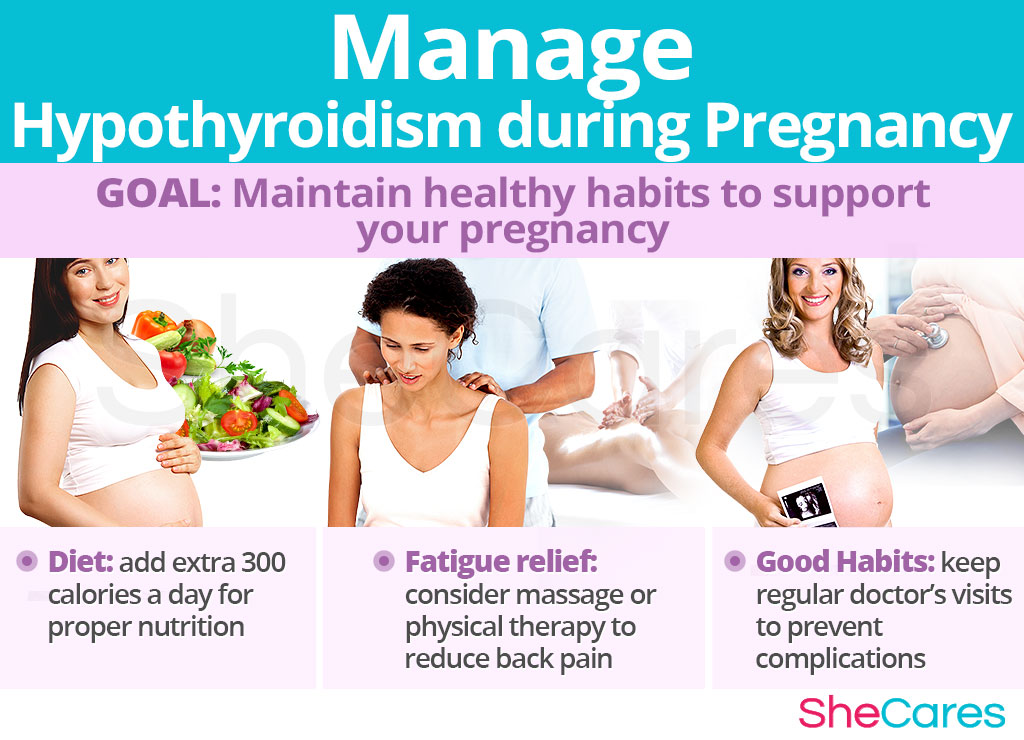
Key Takeaways
Preparing for pregnancy with thyroid disease, such as hypothyroidism, is a joint effort between a woman and her doctor, which requires diligence and commitment. Along with medical solutions, a nutrient-rich diet and supplements, such as Macafem, can nurture your thyroid gland and reduce its negative effects on your fecundity, allowing you to enjoy a safe and healthy pregnancy.
Sources
- American Thyroid Association. Pregnancy and Thyroid Disease. Retrieved November 24, 2017 from https://www.thyroid.org/thyroid-disease-pregnancy/
- British Thyroid Foundation. (n.d.). Pregnancy and Fertility in Thyroid Disorders. Retrieved November 24, 2017 from http://www.btf-thyroid.org/information/leaflets/38-pregnancy-and-fertility-guide
- Iranian Journal of Reproductive Medicine. (2015). Thyroid dysfunction and pregnancy outcomes. Retrieved November 24, 2017 from https://www.ncbi.nlm.nih.gov/pmc/articles/PMC4609317/
- Indian Journal of Endocrinology and Metabolism. (2012). Hypothyroidism in pregnancy. Retrieved November 24, 2017 from https://www.ncbi.nlm.nih.gov/pmc/articles/PMC3354841/
- Maedica. (2010). Maternal and fetal complications of the hypothyroidism-related pregnancy. Retrieved November 24, 2017 from https://www.ncbi.nlm.nih.gov/pmc/articles/PMC3150006/
- March of Dimes. (n.d.). Thyroid conditions. Retrieved November 24, 2017 from https://www.marchofdimes.org/complications/thyroid-conditions.aspx
- Mayo Clinic Proceedings. (2009). Subclinical Hypothyroidism: An Update for Primary Care Physicians. Retrieved November 24, 2017 from https://www.ncbi.nlm.nih.gov/pmc/articles/PMC2664572/
- National Institute of Diabetes and Digestive and Kidney Diseases. (2012). Pregnancy & Thyroid Disease. Retrieved November 24, 2017 from https://www.niddk.nih.gov/health-information/endocrine-diseases/pregnancy-thyroid-disease
- Therapeutic Drug Monitoring. (2006). Thyroid Function Testing in Pregnancy and Thyroid Disease: Trimester-specific Reference Intervals. Retrieved November 24, 2017 from https://www.ncbi.nlm.nih.gov/pmc/articles/PMC3625634/
- Thyroid. (2011). Guidelines of the American Thyroid Association for the Diagnosis and Management of Thyroid Disease During Pregnancy and Postpartum. Retrieved November 24, 2017 from https://www.ncbi.nlm.nih.gov/pmc/articles/PMC3472679/
